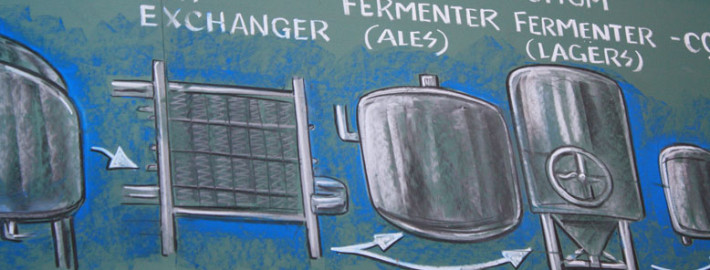61 Brewers Speak Out: What I Wish I’d Known Before Starting a Brewery
So remember that first time when you said, “I think I want to start a brewery”! After all of those experiences of getting the brewery up and running, if you could travel back in time and tell yourself some advice, what would it be? At MicroBrewer, we wanted to know and thought that you might too so we asked craft brewery owners the following question:
What do you wish you had known before starting your brewery?
The responses were awesome and really reflected how amazing the craft brewery community is! After reading through all of the responses, we started to see some major trends so we’ve put the responses into major categories. At MicroBrewr, we’ll be focusing more on each of the topics below in future blog posts and podcasts so if you haven’t yet, make sure to sign up for our mailing list in the box below!
Plan For Expansions From the Start
What’s one of the most common responses that we got? People loving their beer too much! Planning for expansions from the start is key… especially with how quickly the craft beer industry is growing!
Derek from 192 Brewing
I am still amazed at how fast we are growing, so I think that if I had seriously known how fast the growth was going to take place, I might have spent a little more time researching “next steps” in the growth process. I assumed I would be able to grow at a slow comfortable pace, but there is too much demand to let pass by, so the hours are much longer than expected to try our best to keep up with the next immediate needs of the business, and that tends to be the only focus for about 6 months out of the year. It can be a constant rat race to get the projects done just in time for them to be already behind production needs upon completion. This also causes a lot of stress on the team, even for those that also see the potential for the constant growth. A larger brewing system is a next step that looms over our heads at the moment, and will require a change of location for that operation.
Lynn from Great Storm Brewing
I wish we’d known how much our wonderful customers would love our beer; we should have started with a bigger system! We’re small, we only have a one barrel now and are working on getting a 10 barrel system in the next year or two.
Hear Great Storm Brewing on MicroBrewr Podcast 054.
Myles from Borderlands Brewing
People are thirsty! We started with a 3 barrel brewhouse, and that barely made enough beer to keep our tap room stocked. And the tap room was only open two days a week. We recently upgraded to a 20 barrel system, and we’re already planning the next expansion!
Hear Borderlands Brewing on MicroBrewr Podcast 030.
Brett from Dust Bowl Brewing Company
I would have built a larger infrastructure at the outset. We’ve expanded the operation and reached capacity production three times since we started brewing in 2009. We’ve now maximized what we can fit in the footprint of our current building. We are in the process of relocating to a new location. Our new site will, of course, have room to grow, so at least we’ve learned!
Hear Dust Bowl Brewing Company on MicroBrewr Podcast 027.
Mark from Missouri Breaks Brewing
I think the single biggest thing was that I thought too small. Our kettles are 220 gallons so we do 5 barrels at a time…but we started with a 40 gallon kettle. Yes, 40 gallons, then went to 55 and then to 220….
We actually drank out of beer opening day and had to close for 2 weeks! A lot of this is that we just threw “a few bucks” together and started brewing. I am the local doc in town so I have another job! I taught my daughter how to brew and she is great at it. I guess I should have thought if I am going to do this, just make the investment and do it. We are still growing and have the next step soon.
Barry from Pug Ryan’s
When we began the brewery addition to our steakhouse in 1997, we never imagined that our 15 bbl brew house with four 15 bbl fermentors and four 15 bbl brite tanks could possibly ever max out. I wish I had known more about the culture surrounding the Craft Beer industry and how much Craft Beer was about to explode. I also wish I had more insight into the physical plant size needed to manage growth opportunities. This perhaps would have helped dictate the size of our brewery from the beginning and aided in the timing and scope of the expansion we completed two years ago.
Peter from Miami Brewing Co
I wish I had planned better for the size of it all. You think you plan it right and have enough space and capacity for all that you’re going to need, but once you start you realize you need more.
The Owners from Birdsong Brewing Company
We wish we knew about the small stuff before starting a brewery! Things we didn’t realize we should know, like how to pour concrete, would have been so helpful during the initial construction process and as we’ve continued to expand. One big element we didn’t really foresee throughout the years has been how successful our tap room is since we’ve opened. Charlotte’s beer scene has grown dramatically over the last few years, so we probably would have made our tap room more spacious. Our consideration of our growing customer base was underestimated; people like us a lot more than we ever realized!
Hear Birdsong Brewing Company on MicroBrewr Podcast 017.
Patty from Pecan Street Brewing
We underestimated the capacity of the brewing system we would need and also underestimated the amount of cooling space and space in general for the brewing area. So, I guess you can say that we wish we had planned and built a larger brewing capacity and more cold storage.
Hear Pecan Street Brewing on MicroBrewr Podcast 023.
Tom from Yards Brewing Company
I wish I had had a better sense of what the craft beer industry would become when I first started. Back then, I don’t think anyone expected it to be what it is today. Now Yards has the ability to grow and adapt with the industry as it continues to progress, but at the time I may have made some different decisions, had I had a better picture of the potential for innovation and success down the line.
Hear Yards Brewing Company on MicroBrewr Podcast 015.
Brian from BAD Brewing Company
I guess the main thing that I wish I knew getting into the brewing industry would have been the demand. When we started over a year ago, we were operating a very small 1/2 bbl system and actually ran out of beer after just a month. Since then we have upgraded to a bigger system to meet the demand, which is still tough due to the growing popularity in craft beer. So it would have been nice to know in advance that we would be selling as much beer as we do. Not a bad problem, but problematic.
Eugene from Alamo Beer Co
This is a good question… however I changed it and asked folks at the 30 breweries I toured before starting on my own: “If you had it to do over again, what would you have done differently?” Wow… the things you can learn from others who have been there and done that. Our brewery is fully planned on paper to reach our goal of 40,000BBL/Yr production. Each tank location, warehousing, cooler, etc is all down on paper and pre-planned. There are a lot of dashed lines on our plan that represents the future.
Hear Alamo Beer Co on MicroBrewr Podcast 002.
Costs to Running a Brewery and Time Required Will Be More Than You Plan On
You know that budget you planned on and the amount of time that you think you’ll have to put into the brewery? Well, you might want to increase those numbers a bit… maybe a lot!
Devin from 7venth Sun Brewing
Before we got started we did a lot of research on what to anticipate from seasoned veterans in the industry. All of them said that we should plan for everything to take twice as long and cost three times as much. We approached our plan with this in mind and they were certainly right. We planned for it to take twice as long and cost three times as much and it still took twice as long as that. We ended up completing our buildout and our small expansion just in the nick of time and we consider ourselves very lucky to be where we are.
Hear 7venth Sun Brewing on MicroBrewr Podcast 021.
Scott from Adelbert’s Brewery
Overall, I have been fairly lucky because I did a lot research and worked with a brewery consultant before opening, which helped prepare me for a lot. The things that I wish I knew about ahead are construction costs and time commitments. They are always a lot more than what you expect. Take your worst case estimate of them and double it then you might be close.
Hear Adelbert’s Brewery on MicroBrewr Podcast 003.
Adrian from Eastern Shore Brewing
I wish I would have known…..man so many things. My biggest pieces of advice are: 1) Take you budget and double it. Contractors will always find things that you and they missed in the plans and walk throughs. 2) Take your time line and triple it. Govt shutdowns, licensing, regulations, zoning….these are all done on other peoples schedules.
Mark from Atwater Brewery
I wish that I would have known the complexity of the 3 tier distribution system better prior to deciding what beers to launch, along with a better understanding of the chain network. We purchased an existing brewery so we would have liked to have known the amount of additional money it was going to take to get the equipment into top shape. Like any business it is the unknowns that are most difficult in the beginning and that is why sufficient working capital is essential.
Carolyn from Flossmoor Station Brewing Company
Our desire in opening a brewpub was to provide a warm and friendly community pub environment that brewed exceptional beer. Having no prior brewery experience we had no idea the set up would be so complicated or that the financial commitment so big!
Ted from Brewers Union Local 180
I wish I had known more about the particular property that I was going to install the pub and brewery in. A better and more careful inspection would have given me a better idea of the cost of the build-out.
Hear Brewers Union Local 180 on MicroBrewer Podcast 024.
Tony from Pagosa Brewery
EVERYTHING! More specifically… How quickly labor costs can rise. To achieve our proper level of service, high-quality food & award-winning beer, labor has become more expensive than anticipated.
Ken from Nexus Brewery
First thing I thought about was “I wish I would have been aware of all the challenges we were up against in redoing an old warehouse. Our architect and contractor continuously ran into obstacles that delayed construction an increased costs”.
I also wish that I would have known exactly how consumers would react to being the new kid in town on the beer scene. The beer geeks were nice and rolled through at the beginning. The interesting thing was there was a big demand for the menu which we did not know would take off like it did. We transformed from a brewery tap room with some good food to a full blown restaurant. Not complaining but my business plan was blown out of the water within 12 months.
Nick from Opposition Brewing Company
As a nano operation, it is critical for us to keep costs and overhead as low as possible while pouring every bit of revenue back into the business. To do any less would result in a lack in ability to grow the business and lead to ultimate failure. That said, while I fully acknowledged this fact prior to opening, I didn’t have a true realization as to what this would mean for me and my partners. We have been working 12 hour days, 7 days a week, for little to no pay for the past year and a half. Don’t get me wrong, it’s paying off and we’re on track to expand into a 7bbl system in the next 12 months, and the work has been vastly rewarding – we love coming to work every day – but it’s been a hard road. But you know what they say… nothing worth doing is ever easy!!
Hear Opposition Brewing Company on MicroBrewr Podcast 016.
Mike from Revolution Brewing
I wish I’d known the high cost of licenses, taxes, fees, bonds, insurance… nothing to do with brewing and everything to do with brewing business. Also, the reality of the cleaning chemicals… The awesome reality of cleaning chemicals…
Cathy from Philipsburg Brewing Company
We wish some one would of told us how many hours it takes to get a brewery up and running and how complex the whole business is.
Hear Philipsburg Brewing Company on MicroBrewr Podcast 020.
Brian from Bard’s Tale Beer Company
Bard’s Tale Beer Company is a gluten-free brewer that chose to utilize a contract brewer rather than build our own brewery. Our objective was nationwide distribution of a specialty beer. As such our capacity needs would increase rapidly over a relatively short period of time as we added distribution. There is excess brewing capacity so we felt we could partner with a premier brewer to produce our beer and devote our human resources and capital to sales and marketing instead of a brewery.
Looking back, we could have raised more capital. We don’t control the brewery so our flexibility is somewhat limited in terms of pilot brews, etc. And finally, the brewing business is very competitive for wholesale distribution and retail shelf space. You cannot rest.
Mark from Aviator Brewing Company
Get plenty of credit cards, prepare for no sleep, drink more beer than you thought humanly possible.
Hear Aviator Brewing Company on MicroBrewr Podcast 075.
Permitting and Other Legal Issues Are Complicated And Take Time
One of the unfortunate realities with our beautiful industry is that it is highly regulated which can cause multiple road blocks through the process.
Seth from Bull City Burger and Brewery
Even with two other operating breweries in my city prior to my opening, many of the city inspectors, officials, etc. had no idea or understanding of what a brewery was or how it operated and that created some resistance and hurdles requiring explanation on my part to teach our inspectors how we operate. Some people assumed the worst or had preconceived notions.
Finding local professionals to assist with installation. It’s not like most of the local HVAC/Plumbers/Electricians have done tons of these and it’s a cinch. Again, I had to educate myself in some areas in order to tell them what they had to do to meet code or to make something functional in a brewery.
Hear Bull City Burger & Brewery on MicroBrewr Podcast 076.
I would say that before opening the brewery, it would have been beneficial to have a better understanding of the lengthy drawn out process of permitting for construction and a more accurate understanding on the timeline for build out would have been useful. These were two items that having further clarity on would have helped ease the process a bit.
Ozzy from Mayday Brewery
How to handle effluent. I knew that effluent would be a big deal, but I didn’t know (and still don’t know) all that I need to know about treating waste water before we send it to the sewer. Another huge thing would be determining yeast health after harvesting and before repitching.
Hear Mayday Brewery on MicroBrewr Podcast 001.
Rich from Bridge and Tunnel Brewery
In terms of other brick walls that I’ve hit, I wish I had known how convoluted the zoning regulations in New York City are when it comes to breweries. I’m not saying that it would have halted my efforts to get up and running, but it’s been the cause of a fair amount of wheel spinning in trying to get out of the 150 square foot space that I currently am brewing in. On a physical basis – I wish that I had better welding skills. If I was able to weld stainless, I’d probably be half way to a bigger system by now.
Ryan from Gunpowder Falls Brewing
Before starting the brewery, it would have been great to know everything that is regulated by the many state and federal government entities. A couple of million dollars would have been nice too!
Jennifer from No Label Brewing Company
We wish we would have known at the beginning that starting a brewery is a waiting game. You’re waiting on permits, etc. that’s out of your control. It’s hard to let go and just wait. We all have learned how to be patient so maybe it wasn’t all that bad. Starting a brewery takes TIME if you want to do things right. We are now in our 3rd year of brewing and have come to understand how everything works.
We also wish we knew how much money it really takes to start a brewery. Things break, a batch doesn’t turn out right, etc. These extra costs need to be planned as much as possible going into starting a brewery. There will always be surprises when running a brewery. It’s important to roll with the punches.
Douglas from Societe Brewing
The one thing I wish I had known before was “how truly difficult the licensing process is”.
Stephen from Arkose Brewery
We wish we had known how long the approval process took for getting a brewery permit. We would have started the paperwork process much earlier.
Robert from Reads Landing Brewing Company
I wish I had known how difficult it would be to deal with the federal and state governments regarding regulation of brewers permit application process. It wasn’t so much the paperwork, it is dealing with representatives from both. The fed and state both lost my applications and paperwork, pushing my approvals back at least 4 months. My state permits were also held up during the great state government shutdown of 2012.
Opening A Brewery is More than Just Brewing Beer… Get Ready For Administrative Work!
Think that opening a brewery means that you can just brew all day? There’s a lot of administrative work that goes into running a brewery!
Landon from Bitter Esters Brewhouse
I wish I would have known how to properly interview employees and know how many employees I would need to keep our facility in operation. I am getting really good at it now but after tons of turnover we have a great staff. We are a mostly seasonal town in Custer and I have to hire many people every single year and its really quite hard to do.
Todd from Boulder Dam Brewing Co.
If I had known how much administrative work I would be doing, I would have built a bigger office inside the brewpub!
Hear Boulder Dam Brewing Co. on MicroBrewr Podcast 034.
Josh From Huske Hardware Brewing Company
I wish I knew how to brew beer! LOL. I am a recently retired Veteran and have been around the world more than a few times. I consider myself a True Beer Geek/Connoisseur……but it would also be nice to actually brew what we make. I enjoy the hands on aspect of our business in working with people, but I lack the technical skills so I have simply hired folks smarter than me in their respective trades. This has worked well – Jack of many trades – master of none…
Michael from Iron Springs Pub and Brewery
Honestly, I had so many years of experience behind me I really knew exactly what I was getting myself into. I think the biggest thing I wish I knew, was how well my back was going to hold up-which is not great. Soon after we opened the pub I went through a series of back surgeries which forced me to focus my energies else where in the business, and less on the physical part, which is the brewing part. So I had to sort of re-invent my roll at the pub. At the end of the day, it all worked out for the best. Also, because we came from out of state I guess I would have to say, I wish we had known more of a network base out here. We had a little, but it took awhile to establish ourselves with all our contractors, purveyors, and employees.
Heather from Selin’s Grove Brewing
I wish we knew more about personnel & restaurant management. Also I wish we put in better quality flooring & drain materials in the brewery from the start.
Nigel from Horsefly Brewing
I wish I knew how much taxes take away from the ability to re-invest in my business. All the government regulations and paperwork are a hindrance as well.
Hear Horsefly Brewing on MicroBrewr Podcast 018.
Running Brewpub is Opening a Restaurant that Sells Beer That Was Brewed There
Thinking of opening a brewpub? Realize that you’re really opening a restaurant that also brews its own beer on site so doing a lot of research on restaurant management is key.
John from Adirondack Brewery
I wish I paid mote attention when I was in High School! I was more concerned with how cute my lab partner was. Also opening a Brew Pub at the same time made me wish I knew more about the workings of a busy restaurant. I thought I was opening a Brew Pub, when I was really opening a Restaurant that sold beer that was brewed there.
Jim from Island Hoppin Brewery
I wish I had known just how much more was involved in running a microbrewery than simply making beer. Writing about it is very nostalgic because I don’t write a journal and it is forcing me to look back on a timespan that has been one of the best times of my life. The brewery has been a massive step for me in learning how to be a better business owner and person in general. Because, I guess, another answer to your question would be that ” I could never foresee that the brewery would become my whole life”
Jack from Fort George Brewery
Okay, I guess getting advice and listening to advice are two different things. I was told by many folks that being a brewer and running a brewpub are two entirely different occupations. It took me a couple of years to realize that I couldn’t brew, cook, wash dishes, wait tables and open/close the pub while I was running the pub. It is good to stay involved and know what is going on and do the work that nobody else likes to do, but you have to make time to meet and greet customers, schmooze city officials and keep the books in order as well.
Kevin from Mountain Sun Pub and Brewery
I own a brewpub and we are basically restaurants. What I wish I had know before starting would be how to manage a restaurant better!
Talk To Other Brewers in Your Area and Do Your Research
Like no other industry, members of the craft brewing community are so generous to share their advice on how to success (like in this post!). Talk to everyone you can and be ready to take notes!
Greg from Sleeping Lady Brewing Co
The biggest thing to understand in any brewery is that something is always about to go wrong. However, I know that when I began brewing, I didn’t truly understand how gracious the brewing industry can be. Many brewers are in direct competition with each other yet we tend to drink (and appreciate) the beers that our friends are making. Brewers tend to help each other out with things like advice, ingredients, and man power. It’s like no other industry I’ve ever seen. I feel fortunate to be where I am and I love our industry.
Grant from 3 Sheeps Brewing
Brewing as a manufacturing process is relatively easy. Then comes bottling. You now have multiple machines with multiple moving parts, some pretty tech-heavy computers (depending on how quickly you are trying to bottle and how low you want your oxygen levels), heavy demands on air, CO2, and electricity, and a good chance that things are going to break or wear out. To consistently run a bottling line takes skill, and unless a person has this experience, there will be a learning curve involved. It took us longer to get our bottling line running than I anticipated. We have learned a lot since that first run. I believe we now are very capable of making sure that our bottling line continues to run and puts out very high quality product. If I could have picked up some of these skills before though, it may have been a much easier journey to get to this point.
Hear 3 Sheeps Brewing on MicroBrewr Podcast 004.
Nate From Justice Brewing
The one thing I wish I had known more than anything else was utilizing more efficient means of water heating and putting in much larger electrical capacity. We’re only a small scale nano right now, but we could’ve saved a lot of space and time by going with tankless water heaters over a gas fired hot liquor tank. Didn’t know about them until it was too late. Second, I wish I had known how volatile some suppliers are and that prices fluctuate a ton. We’ve gone through 3 different bottle suppliers due to skyrocketing prices through some, we finally found a good consistent supply at a decent price. It’s really hard for us small guys that only use about a pallet of bottles a month.
Ken from Rust Belt Brewing
Simple answer, how distribution works and ways to motivate your distributor to move your product.
Scott from Thr3e Wise Men Brewing Co
I had been running 8 restaurants before I opened my brewery, so I was expecting most of the “issues” that maybe a 1st time owner wouldn’t expect. I’m not a brewer, I hired one, so I even knew what to expect out of that relationship.
I’d say the most important thing would be to know the equipment manufacturer that you buy from – make sure you trust them and that they do good work. We bought equipment for our brewery in Indiana from a vendor in California. There were problems with installation and follow up on issues when equipment broke down that someone a little closer may have helped more. It is just good to do a lot of research and not try to “save money” on the expense that is driving your business success.
Ben from Atlas Brewing Company
One thing that would have done me a lot of good if I had known it before I started brewing at Atlas is that most new breweries take some time to dial in their recipes. I experienced a lot of stress worrying about minor imperfections in our procedures early on. Since then, I’ve observed many newer breweries start up, and it seems pretty much universal that brewers take a few batches to figure out the ins and outs of any new brewing system.
Chris from Holy City Brewing
I had a few years to plan and think about how I wanted to open HCB. I went to school, got a job with a brewery, and tried to prepare myself for what I wanted to do. There are things that I have learned along the way, but the advice I normally give to people when they say they are trying to open a brewery is either get a job somewhere or hire a brewer. While its a fun job, it’s also a business and jumping from a hobby to something professional takes some planning and time.
A better understanding of our market would have been nice. We underestimated the amount of kegs off the bat, and had to come up with a lot more money quickly to keep up with demand. Other than that, I feel like working in a brewery prepared me for what to expect when it comes to the amount of time and manual labor that is involved.
Jeremy from Shmaltz Brewing Company
When I started Shmaltz Brewing 17 years ago, I asked as many people as I could find a ton of questions – over and over! And I still didn’t do nearly enough research about the beer business. Even as a contract brewer for so many years, just wrapping my brain around the distribution and sales and marketing side of the biz took many years – and I’m still learning! I tell all the new brewery folks to take a long deep breath and ask even more questions and take even more time than you’d ever think necessary so you’ll be as prepared as possible for the wild ride ahead. And then go sell beer – every day – over and over. And have a ball – Welcome to the show!
Tom from Ambacht Brewing
One of my favorite quotes (I have quite a few favorites, one for every occasion!): Fools rush in where angels fear to tread. I came into the brewery business by the back door: I was looking for work and not having much success, so I volunteered to help the brewer at a microbrewery down the street. A few months later, the owner sold the building, land, & business (this was the height of the real estate boom). The new owners did not want the equipment, being a synagog and all. So I bought the equipment from them and then spent a year looking for a location. Then started making some beer, dumping some beer. Eventually figured out what was wrong (can you say sanitation?). Now we make super-clean beer that we bottle condition with honey and has a 2-year shelf life! So here I am five years later, hoping to pay myself something this year.
The Journey Is Half of The Reward of Starting the Brewery
And now, some inspiration! You’ll never know everything and after awhile you’ve just got to take the plunge. After all, what would be better than telling your friends you brew beer for a living. Go for it!
Tim from Arcadia Brewing Company
I wish I knew just how much fun and rewarding becoming a Craft Brewer would be, and I would’ve left that perfectly good paying job about 5 years earlier.
Jeff from Black Star Co-op Pub and Brewery
I believe that if you’re truly into your idea and work relentlessly at it, you’ll get what you need to know when you need to know it.
Hear Black Star Co-op Pub and Brewery on MicroBrewr Podcast 047.
David from Abita Brewing Co
Well that is a dangerous game to play. If you changed anything, would we be where we are today? I will take what we have now and know I have learned valuable lessons on this path.
Andy from Blackrocks Brewery
Can’t think of anything of the top of our heads. The stuff you don’t know becomes part of the journey. It’s better to roll with it, realize you don’t know everything, learn, and enjoy the ride.
Mike from Founders Brewing Co
Don’t build you brewery around market trends. Instead, listen to your inner passion.
Danny from CAUTION: Brewing Company
I honestly wouldn’t have changed a thing. I think being a brewery that have thrown caution to the wind, we’ve done many things that we did successfully because we didn’t know any better. The only things we knew going in was the existence of an amazing community brewers, killer beers, and support from our local communities. I believe that was all that we needed to get going and keep us going.
Erich from Studio Brew
When the excitement becomes a desire which turns into passion; brewing a craft beer for the first time is pure nirvana. Hold your glass up and look into it. If you see the future then you will understand the opportunity you just created. No one told me this, I experienced it myself. I have had so many people express their thoughts along the way.
Many told me what I needed to do only one told me what NOT to do which was the best insight. “Never believe you can build a brewery with just a good beer.” For what it is worth, I have people come up and talk with me about their dream of starting a brewery. Sadly I rarely hear them use the words “business and/or profit”.
Hear Studio Brew on MicroBrewr Podcast 025.
Samantha from Steven’s Point Brewery
We wish we’d known A LOT of things before starting our brewery, but everything that has happened over the last 157 years has ultimately led us to where we are today.
We wish we would have known: How many houses would build up around our original Brewery. We should have bought the whole block!!! That prohibition was coming!! That IPAs would become SO POPULAR! About Hard Cider! How many craft breweries would eventually exist. How devastating the upcoming wars would be. How well our brewery would stand the test of time. That Point Special would be our #1 seller for 157 years.
So What Do You Think?
So was there any advice that really stuck with you? Did I miss anything? I’d love to hear what your comment on the question: What do you wish you had known before starting your brewery? If you’re thinking of starting a brewery, what’s the main questions that are on your mind?
These comments will help shape the future posts and podcasts that I’ll be putting on MicroBrewr in the future. After all, I love to give back to this amazing community as much as I can! So go grab a local brew and lets keep pushing the craft beer movement forward!
Join the mail list
Don’t miss other great posts like this one.
Sign up for the email list: Sign me up!












Here’s an awesome comment I just got from Jeffrey from Very Nice Brewing Company in Nederland, CO!!
I realize it is not such a realistic or tangible thing, but I think I would have to say that I wish I knew that, “it
was all going to work out”.
We worked up to 90 hour weeks for months before opening up the brewery and for many months after. We both invested our retirement into our business. quit our jobs. We went all in and totally invested in this dream. We knew many mistakes were going to be made, that there were going to be moments of complete frustration, doubt, and fear, but we had no idea how intense it was going to be. I guess what I’m saying is that you cannot possibly know everything before starting a brewery, or any business for that matter, so trying to answer your question in a rationale way may be impossible. There was just so much we didn’t know, and every answered question brought up three more. No matter how much ground work you do, how much you prepare, you are going to face problems that feel insurmountable. We had freak outs, tantrums, stages of depression, doubt, and levels of anxiety never imagined.
However, as each negative emotion was overcome and for each victory, there was elation. Along with that elation came confidence and a new type of pride that only comes from conquering something that you were truly fearful of. Overcoming problems that could very well had sunk you gives you the type of confidence a tight rope walker has after reaching the other side without a net. The type of confidence that only comes from confronting a real danger or threat and prevailing.
I wish we had before building and opening the brewery, the knowledge that was only possible by building and opening a brewery. I hope that makes sense.
I’ve done several start up business’ (none of them breweries yet, which is why I am reading this thread) but no truer words were ever written than this post.
Thanks for the feedback Steve! I’m glad it was valuable and it’s all due to everyone who was kind enough to share their experiences!
In the last 7 yrs I’ve become what I call a “beer snob”. I use this phrase in a comical sense. After reading all what goes into the making and probably the ones we don’t see, breaking, to plan and build a business such as a brewery, large or small, there is nothing comical about it. I’m sure, in fact aware of the stress, conflicts, overall blood, sweat and tears that goes into it. I say this only because the brew pub I frequent allowed a small number of us regulars to form our own in house brew club. We are able to meet, decide on a style and create our beer with use of the owners equipment and product. One day too, with this sort of hands on training, I along with a partner would hope to fulfill a dream of joining the ranks and calling ourselves ” Micro Brewers
I’m four months into building a taphouse to a brewery with a partner, whom I believed to be a good friend. I’ve learned, the hard way, that you had better REALLY know your partner if/when you get into a partnership. If he’s been divorced, why? Really, why? Because a partnership is a lot like a marriage, and sometimes a person’s true self doesn’t come out until after the paperwork has been signed. Last thing you want to do is find yourself stuck in a contractual agreement with someone who is a bullying narcissist.
I owned multiple coffee shops as well as a roastery, and your comment is spot-on. Five years after shutting down the company I’m still dealing with legal issues due to an untrustworthy business partner. You’re better off choosing an acquaintance that is knowledgeable and that you respect, even if you don’t hang out outside of the workplace. Being able to call each other out on potential B.S.without the friendship getting in the way is paramount to success.
Pretty much. I’ve been in the planning stages to open a 3BBL taproom and have been very careful in selecting partnerships. My last partner that I decided not to be involved with would have turned into a horror story had I continued. It is totally like a marriage so make your selection well and listen to that part of you that gives you the right decisions. Turns out, after I told him I didn’t want him as a partner, it was nothing short of shitty late night texting and threats. This was a person I’ve known for years.
Chad, that sounds pretty bad. I’m sorry you went through that.
Luckily for me, although my partners and I have parted ways, we are still friends.
Through that experience, I learned that a shared vision is crucial. What it came down to was that we were trying to do different things. I am trying to focus my vision, and I am trying to be better at expressing my vision clearly.
That is one of the main reasons I have started blogging about beer and the beer industry. Some of the posts are solely about casting my vision. One post in particular is about picking partners.
http://nathanpierce.me/entrepreneurship/how-to-choose-partners-when-starting-a-brewery-a-shared-vision/
Ain’t that the truth. I’m on my 5th business. 2 of them were partnerships. Never again.
I couldn’t agree more.
I’ve co-owned 2 businesses, both of which were on-track to become very profitable very fast… but they both crashed. Why?
It wasn’t the logistics, margins, any of that – that’s all amenable. It was my choice of partner.
If someone isn’t willing to change or be humble, to try new things, I think you should consider immediately getting rid of them. In both cases my partners were too stubborn and arrogant to adapt to the problems we faced, to listen to constructive criticism.
For one business this ended in a simple crash-and-burn due to rising labor costs exceeding returns, the other a lawsuit against the company and its employees. For me, the latter was a nightmare worst-case scenario.
I almost feel like open-mindedness and humility are the two traits you have to have in a partner or else it’s just gonna go nuclear at some point. But maybe that’s just my experience.
Here’s another great response I had to share from Zach at Sanitas Brewing Company in Boulder, CO:
I’m one of the owners of a 6 mo old brewery in Boulder (Sanitas Brewing Co.) and we are doing really, really well thanks to the support of the local beer community. However, one thing that i really wish we would have known that i didn’t see listed was “pay a professional a SHIT TON to do something right from the start, and you’ll save yourself a lot of money in the long run.”
Cheers!
Zach
It’s a cute article, but could have been much more informative. If you really wanted to know what brewers wish they knew before starting a brewery, you’d ask the ones who failed.
Thanks for the comment! I did email a number of breweries that failed but most of their email addresses were already shut down so I didn’t get any responses from them. If you have an idea for a better way that I could get in contact with them to add this info, I’m all ears. Thanks!
Hi there, I desire to subscribe for this
website to obtain latest updates, thus where can i do it please
help.
You can subscribe by entering your email address into the field at the top of the main page.
There is also a dedicated page: https://microbrewr.com/ebook/
I wish I knew that trying to grow your brand/distribution network doesn’t always mean more revenue. We have tried to grow to keep up with demand and found that you have to spend a ton of money to do it. Buying more kegs, equipment, trucks, sales team etc… pretty soon you are making just enough beer to cover just those costs and working harder and not really making money…. sometimes losing it too.
Tony…
Flyers Restaurant and Brewery
Thanks for your input, Tony. Those are some things I’ve wondered about…
Great article, i have put link on our site. http://www.brewplants.com/brewery-expansion/
Thank you.
Thank you! I hope it helps some Czech brewers. I shared the piece on twitter and FB
I have been in the craft beer industry for close to 20 years. I have built and designed several breweries and commissioned close to 100 microbreweries around the world.
I still don’t know all there is but I can certainly help you save money and headaches.
Give me a shout
David,
Would love to pick your brain. Please send your contact information to me at bobpowers12@gmail.com.
We know we have a lot to learn, but luckily we have some time on our hands.
Thanks
Thanks, David. We all need a little help, or sometimes a lot, now and again.
Hi David,
I am new brewer to this industry and would love to open my own brewery, but I am not very educated in the start up business aspects. What are a few good things you would consider and advise me on going into a small brewery – possibly 7 to 10bbl???
We are a professional brewery equipment manufacturer in CHINA,pls visit our website:www.zybrew.beer,I can help you design and produce the whole 7bbl or 10bbl brewery system. My email:dana@zybrew.beer; skype:danaxing2013.
We are looking to buy brewing equipment.
Hi David,
Could you please send your contact info to phillip.t.helm at gmail dot com?
Thanks!
Have 15 bbl brite / fermentor and Malt Mill for sale: dino@bloodlinebrewingco.com
in Sonoma County,Ca.getting out of the business -love the people/hate the margins!
Good tip…
I read it twice and shared it with a few microbrewery owners! Excellent article!!!
Thanks, Karen!!! 🙂
Hey there!
I own a seasonal very successful restaurant in Maine and do pretty well. I am also a beer lover and looking into options how to brew my own beer and sell it at the restaurant. I am less interested in selling elsewhere. Any advice out there how to get started?
Thanks!
You’ve come to the right place, Heather. This post is a good start. And check out the podcast. All episodes will give insight, but you might start with the brewpubs: https://microbrewr.com/tag/brewpub/
Fantastic web site. A lot of useful info here. I am sending it to some pals ans additionally sharing in delicious. And certainly, thanks to your sweat!
Thank you, Tiantai. I saw that Black Hops got their equipment from you. Very good!
Hey there! I’m an avid long time home brewer with quite a few years of retail and bar/restaurant management experience, so of course I am seriously considering opening a brewpub in my city. I enjoyed reading what other brewers and business owners had to say about the topics. The one thing that really surprised me was how many people got into the business without really knowing what they were getting into. It seems like many were just thinking it would be fun to open a brewery or brewpub… that’s a pretty scary way to get into it. Yeah, I would have to agree with what many are saying, that a person had better realize they will be working all day every day for a while in the business… don’t plan on taking your weekends off for a while! Do as much research and planning as possible before even deciding to jump into a business… failure to plan well for any business often leads to its failure. I probably won’t even dive into my brewpub business for another year just so I can crunch the numbers and be as prepared as possible for a success. Cheers!
What a great collection of advice. I know it’s from a few years ago, but from everyone’s input it seems like they’ve earned the right to their opinions and insight.
I have to say that if no considering of the manufacturing process of the beer equipment, it would be the premises and government documents things which would cost a lot of time. But these also could be moved forward together with the manufacturing process.
For the manufacturing of the beer equipment, it may takes about 1~2 weeks preparing detailed plan and tank drawings etc; The main production may takes about 60~90 days depends on the equipment specifications; The testing may totally need a week; and the sea transportation may takes about 1~1.5 months; The installation and test running on site may takes 20~30 days depends on the equipment capacity and configurations.
Laura Hou
Shandong Tiantai Beer Equipment Co., Ltd
http://www.microbrewerysystem.com
http://www.craftbreweryequipment.com
trade@cnbrewery.com
Thank you for sharing such great information. It’s a pleasure to visit here. You can also visit us in Pig Minds Brewing .
I like that this post shared with us that it is important for a brewery to have all the legal license when operating as it ensures they adhere to the legal requirements. My wife and I just moved to a new town and we were thinking of going to a brewery. Seeing how we are newbies, I will definitely ensure the brewery we walk into is legally authorized and licensed to operate.
Haha good deal, Kristofer! Licensing requirements are designed to protect consumers. Any “business” trying to skirt the law seems untrustworthy to me; I’d feel cautious about trusting them with anything I put in my body–even beer!
It’s awesome that you talked about tips on what to do before opening a brewery. A friend of mine is interested in learning how to brew his own beer. He loves beer, and he’s excited to know how to make one of his own. That’s why I think this article would be of great interest to my friend. I appreciate you helping me learn about the importance of having the right amount of beer kegs.